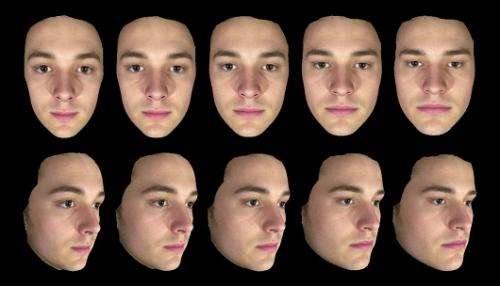Size matters: Men perceived as more masculine if they are taller and heavier, regardless face shape

Researchers at the University of St Andrews have found that men are perceived as more masculine if they appear taller and heavier, regardless of how much their face shape differs from women's, in a new study published this week.
The study, published in scholarly journal Perception, is one of the first to use three-dimensional scans of men's and women's faces to investigate the perception of masculinity.
Lead author Iris Holzleitner, a fourth year PhD student in the University of St Andrews' Perception Laboratory, explained:
"Masculinity has powerful effects on attractiveness and a range of other attributions, such as leadership and trust.
"It is important that we understand the physical basis of perceptions, and the origins of masculine stereotypes. Here, we showed that perceived facial masculinity has several distinct physical origins."
Masculinity has often been measured as the average difference between men and women's face shape. However, previous studies found that masculinity as measured from faces does surprisingly poorly in explaining women's perception of masculinity.
Masculine face shape develops under the influence of male sex hormones, which also lead to men being on average taller and heavier than women. However, individual height and weight can differ substantially, with some men being, for example, much shorter and some women being much taller than the average man or woman.
Iris Holzleitner continued:
"What is new about our study is that we tested whether cues to this individual variation in height and weight may be important when judging men's 'masculinity'."
By comparing the face shape of very short and very tall men as well as that of very light and very heavy men, the researchers were able to determine facial correlates of body height and weight."
Professor David Perrett of the School of Psychology and Neuroscience, who supervised the study, commented:
"We also asked people to judge the height and weight of the men in our sample – again just from their faces. We were surprised to found that the facial cues of height and weight we identified predicted perceptions of height and weight much stronger than actual height and weight.
"Our findings suggests that observers base their perceptual judgments on cues that are rooted in actual physical differences associated with height and weight, but then go on to overgeneralize from these cues (i.e. they read too much into these cues).
"That is, we seem to have learned that, for example, being tall is associated with a more elongated face shape. If presented with the faces of two equally-tall men, and one of them has a slightly longer face than the other, we will be likely to think that the man with the longer face is also taller".
The authors think that this perceptual overgeneralization may also explain their main finding on the perception of masculinity.
Iris Holzleitner concluded:
"Intuitively, people understand that women and men differ in their average height and weight. Our study suggests that facial cues to these traits are overgeneralized when judging masculinity."
More information: The research paper is available to view at: www.perceptionweb.com/contents … rnal=P&issue=current
















